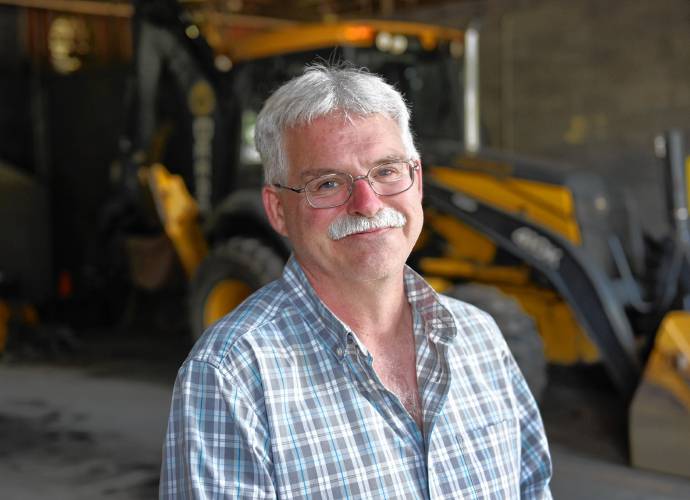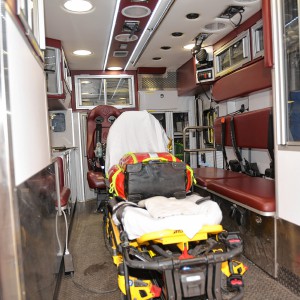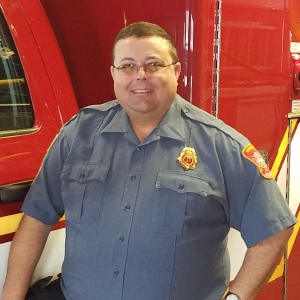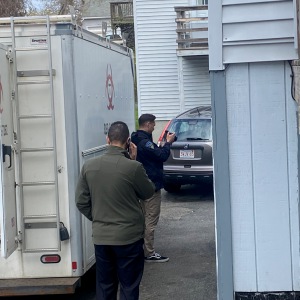With initial support, Greenfield DPW director to move forward with $2M recycling grant

MARLO WARNER II
|
Published: 01-22-2024 4:02 PM
Modified: 01-22-2024 4:32 PM |
GREENFIELD — Having received an initial nod of support from City Council to pursue an automated single-stream recycling program, Public Works Director Marlo Warner II can move forward in the process of accepting and signing for a $2.05 million grant from the Environmental Protection Agency.
According to Warner, moving forward with the plan that was originally presented to the EPA for an automated single-stream recycling program allows for the potential down the road to return to dual-stream recycling using the fleet of single-stream vehicles. Greenfield has manually collected dual-stream recycling since 1992.
“I’ve been working with Marlo for over six years now and he budgets down to the penny,” City Council Vice President Sheila Gilmour said of Warner. “He’s honest; he does his homework. I have faith in him. I know this is not the perfect solution, but I think this is the best solution.”
A formal City Council vote, however, will be required before any money is expended, according to City Clerk Kathy Scott. The council will also have to draft an ordinance to switch from dual to single-stream recycling.
The grant award stems from the EPA’s newly established Solid Waste Infrastructure for Recycling Grant Program, known as SWIFR. Greenfield was among the 25 grant awardees out of more than 330 applicants nationwide, and the only recipient in New England, according to grant writer Athena Bradley.
The $2.05 million grant will require a match of roughly $880,000 — this will largely be a soft match through salaries. Altogether, the money will fund the acquisition of a new fleet of automated collection vehicles, new collection bins for residents (provided free of charge), and a staff person to assist with the education and implementation of the recycling program, according to Bradley. The new collection carts will be able to store up to five times more recyclable material, eliminating the need for multiple units.
Warner appeared before City Council this month after being asked at November’s meeting to present a cost comparison chart for three options: automated single-stream recycling, automated dual-stream collection with single-stream vehicles, and automated dual-stream recycling with specialized, dual-stream collection vehicles.
“It’s a pretty fun juggling act when I think about [safety of] employees, I think about the cost to the city; I have to think about the environment, where we’re at now, where we’re going,” Warner said.
Article continues after...
Yesterday's Most Read Articles
A summary provided to councilors outlined the benefits and challenges of the three options, as well as the cost differences. According to Warner, the second option — dual-stream collection using a single-stream vehicle — is estimated to cost the city an additional $299,600 for carts, plus the cost of an additional driver and added fuel and maintenance for operating three vehicles five days per week to cover all four routes.
Councilors and residents alike had questions about the fuel cost comparison between the first and second option, given that by shifting to single-stream collection, the city would have to haul its materials to Berlin, Connecticut, rather than the Springfield Materials Recycling Facility, which does not accept single-stream collections. Precinct 8 Councilor Lora Wondolowski wondered how the additional vehicle miles to Berlin would compare to the additional miles on the roads in Greenfield to accommodate doubling the route for pickup.
“I can tell you both tractors with a million miles were probably getting 9 miles to the gallon if we’re lucky,” Warner responded, referring to his current fleet. “As you know, the price of new diesel vehicles has probably increased 60% in the last 10 years, and that’s all due to emissions and mileage. To see a sticker on a truck right now, I don’t know what it is, but I can assure you it’s a much better, much higher mileage per gallon. They have re-burn system for emissions; they re-burn the gasses so you’re not emitting.”
The most costly option, Warner said, would be the dual-stream collection using a split-body vehicle and split-body carts, which would require an additional $389,517 for the vehicles.
Some residents, however, are concerned about the contamination potential of single-stream recycling.
“We live in a society that works on a take, make, discard — it’s a linear function,” resident Peg Hall told City Council. “We need to switch to what’s called a circular economy, where someone’s waste becomes feedstock for the next product. For that feedstock to be made into the next product … it has to be good feedstock.”
With single-stream recycling, Hall said, residents run the risk of mixing broken glass with paper, thus bringing down the paper’s quality and market value.
She suggested that with containers three to four times the size residents have now, the city could potentially pick up on a monthly basis, saving the city the cost of a vehicle.
“I think there are options we have not considered,” she said. “I think there are ways we can keep all the advantages of the dual-stream … and find ways to make the collection work.”
Greenfield resident Amy Donovan, who also serves on the advisory board of the Springfield Materials Recycling Facility, advocated for the city to opt for a recycling program that keeps Greenfield with the organization, which is owned by the Massachusetts Department of Environmental Protection.
“[The advisory board] has a very active role in contract negotiations … fighting for the towns and the best financial arrangements for them,” she said. “The current price for the month of January that communities are paying is $40 per ton. That goes up and down with average market value. The contract is very strong and protects us, and makes sure we have a very good revenue share.”
The cost per ton at the Berlin facility, meanwhile, would be roughly $71, according to cost comparison documents Warner shared with city councilors.
“I encourage everybody to take a good look at the Springfield MRF and stay with the Springfield MRF, as we have for 30 years,” Donovan said.
Ultimately, councilors felt comfortable supporting Warner’s recommendation to move forward in the direction of the automated single-stream vehicles.
“We need to make a recommendation,” said Precinct 9 Councilor Derek Helie. “There’s going to be public engagement; there’s going to be other opportunities. We cannot afford to lose this grant. … I know everybody wants the facts in front of them, but sometimes you’re better off trying something, seeing how it works and making adjustments to the plan later down the road ... We can fine-tune it as we go.”

 What are the protocols for emergency transport of infants?
What are the protocols for emergency transport of infants? State records show Northfield EMS chief’s paramedic license suspended over failure to transport infant
State records show Northfield EMS chief’s paramedic license suspended over failure to transport infant Authorities ID victim in Greenfield slaying
Authorities ID victim in Greenfield slaying  Frontier Regional School students appeal to lower voting age
Frontier Regional School students appeal to lower voting age
